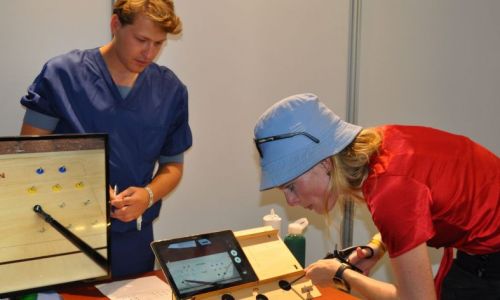‘English has a linguistic stranglehold on people’
-
 Foto: Hamster Factor (CC)
Foto: Hamster Factor (CC)
One of the hottest topics at Radboud University right now is language. The university focusses on English for its main communication, but not everybody is happy with that. Do we need to teach internationals staff and students to speak Dutch?
‘Basically, nobody here expects me to learn Dutch.’ Austin Howard (22) is an American-British student, who came to Nijmegen for at least two years, to do a historical studies master. Even though he is a native English speaker, he is not too thrilled about using English at the expense of Dutch. ‘In a way, of course, the fact that everybody speaks English here makes it easier for me, as I can take my time learning Dutch. On the other hand, it cripples me, because convenience breeds laziness.’
The university’s choice to only use English on its Facebook page, to start English bachelor programmes and communicate in English more and more, does not please everybody. For example, Jan Sinnige and Wesley van der Zande, chairman and board member Internationalisation at the ISO, a national student organisation, wrote in an opinion piece: ‘Of course, the market globalises and students have to be prepared for that. But being prepared means that students are educated to a level that they can work with. And that level, that is where we still have a problem.’
According to them, many teachers’ English is not good enough to give lectures. The way English is introduced to universities right now is hurried and improvident, they say. They fear that financial motives are leading, and that universities just want more international students to come here, since they often pay more tuition fees.
Respect
It is not just Dutch that gets run over by English. ‘The English language has a linguistic stranglehold on people, there is no finer example of neo-imperialism, really’, says Austin. ‘But world languages come and go, it was Latin once, and Classical Chinese, and now it is English. In the future, that might change again.’
He notices that the Dutch do not have an institute to promote their language, like many other countries in Europe. For example, there’s the Cervantes institute to promote Spanish and the Goethe institute for German. ‘I heard that within the Netherlands, there are also people speaking Fries and Limburgs. But regardless of how many languages you have, it would make sense to promote them more.’ Austin is learning Dutch because he wants to know more about the language and the country. ‘It touches deeper issues of respect. If I live here, I feel like I should learn to speak the language.’
Social Dutch
When asked why the university chose to not make Dutch classes mandatory, senior policy advisor Boudewijn Grievink says that the university chose to focus on staff when it comes to language courses. Dutch staff should learn English, so that everybody at the university can communicate with each other. ‘Students do get a 50 percent discount on the Social Dutch course’, says Grievink. ‘That way, the university invests in students’ language skills. We make the course more accessible for people who are interested, but the students and employees also show commitment to learn Dutch (or English).’ Grievink says that learning a new language is also an investment in yourself. ‘You benefit from it the rest of your life.’




Daniela V wrote on 1 december 2016 at 12:44
I agree with you on the fact that becasue you can ‘live’ in English it makes you feel lazy about learning the language. However, I also agree with the position of the university, learning Dutch or any other language is a personal investment.
First, many international students spend here five years and have the intention to stay but do not feel the need to learn the language, this later brings up problems when they want to stay and need to find a job in most of the cases, unless your study field is very specific. Perhaps it will be wise to encounrage students to attend to carreer days and open house events. They will realise they reduce their own opportunities on finding good jobs and interships because they do not speak the language. Afterall, it is a competitive job market and if another person can do the same thing you do and also speaks the local language, you are already falling behind.
Second, and perhaps more important, this is also a matter of maturity and wanting to integrate, if you are always surrounded by international the need to learn the language will drop significantly, unless: you have to do your own taxes, paper work, arrange your own insurance (also done sometimes by the university and as a result: pampering the international students- guidance is important but also being self-sufficient and independent).
It is sad that no one expects us to learn Dutch but this is the result of a tendency shown by students every year, partly I believe because of the following approach: Dutch is difficult and you do not need it.
Nonetheless, the only thing left to do is being serious about learning the language, most Dutch people I know are happy that I take my time to learn their language, this shows them my interest in their culture.
PD: You can also check language policies in the Netherlands. For example: while members of the EU are not obliged to take Dutch courses, other foreigners are oblige as well as taking the Inburgeren exam.
Judith wrote on 13 december 2016 at 16:48
Students like Austin Howard are very welcome in the Netherlands, as they realise that learning the Dutch language is important for getting to know our country.
What Austin may not have realised yet, is that the Dutch government is currently implementing an action plan to retain talented foreigners for the Dutch knowledge economy after they graduate. The plan, with the promising name ‘Make it in the Netherlands’, should make it easier for students like Austen to learn the language and work on their intercultural competencies. The app ‘ Hoi Holland ‘ is a good starting point. Radboud in’to Languages offers courses for students with a 50% discount under the university’s Language Policy. And, finally, Radboud International Students allows students to participate in a language exchange to practice their Dutch.
Naturally the Netherlands also has an official institute for the language: the Dutch Language Union. They provide a lot of information and tools on their website to help out international students. Students like Austin bring the international perspective to our classrooms. They improve the English of their teachers and class mates and perhaps they will stay in the Netherlands after graduation. To work. In plain Dutch.
Judith Arns, Radboud in’to Languages